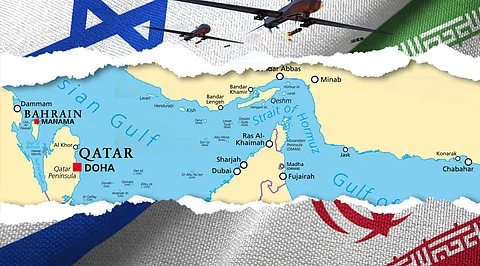

The Israel-Iran conflict has sparked global economic instability, driving oil prices up and threatening major trade routes.
Inflation risks and market volatility are rising, with central banks facing tough policy decisions.
A prolonged war could cause global stagflation.
Tensions between Israel and Iran have erupted into direct conflict, shaking the foundations of global stability. What began as strategic strikes has now escalated into a volatile situation that threatens to ripple through every corner of the world economy. Within days of the first attacks, markets responded with sharp reactions, oil prices surged, and trade corridors grew tense with uncertainty.
This is not just a regional crisis. This is a fault line that could fracture the fragile balance of global trade, energy flows, and financial systems. As the conflict lingers, the pressure mounts not only on governments but also on industries and consumers worldwide.
The Middle East is a critical energy hub. Brent crude prices soared nearly 7%, breaching US$74 per barrel after Israel targeted Iran’s South Pars gas field. Such spikes directly influence fuel costs globally. The situation around the Strait of Hormuz poses an additional risk. This narrow passage handles nearly 20% of the world’s oil flow, close to 21 million barrels each day.
A shutdown of this chokepoint could significantly reduce the global oil supply. This would force prices higher, sending shockwaves through supply chains and driving costs in almost every energy-reliant sector.
The Red Sea and the Persian Gulf, crucial arteries for international shipping, now sit under threat. Any attack or naval blockade could paralyze about 30% of global container movement. Ships may reroute or delay, which can push up insurance premiums and delivery times.
India finds itself in a particularly delicate position. The country imports over two million barrels of oil daily through Hormuz and also exports $1.4 billion in basmati rice to Iran. Disruptions could lead to fuel shortages, declines in exports, and rising consumer prices.
An energy shock often triggers inflation. As oil and LNG prices surge, production costs for key goods, such as chemicals, plastics, and transportation, rise. This eventually affects consumers, leading to higher prices for everyday essentials.
Countries that import energy may suffer from economic slowdowns. Growth projections for Israel have already dropped. War-related expenditures of $725 million a day are straining its fiscal capacity, slashing its 2025 GDP growth forecast to 3.6%.
The conflict has rattled investor confidence. US indices dropped, S&P 500 fell by 1.3%, and Nasdaq by 1.5%. Japan’s Nikkei suffered a 7.7% plunge. European markets, including Germany’s DAX and the UK’s FTSE 100, followed suit.
Investors fled risky assets and turned toward gold and government bonds. Capital outflows hit emerging markets. Bond yields rose sharply as fears mounted over long-term inflation and debt sustainability.
Military firms gained. BAE Systems saw a 3% jump, while defense contractors like Lockheed and Northrop Grumman also climbed. But not all sectors benefited. Disruptions in undersea internet cables and food exports may strain the agriculture and tech industries.
The aviation sector faces chaos as well. With airspace closures across Iraq, Iran, and Jordan, carriers such as Emirates, Etihad, and Qatar Airways have suspended multiple routes. Eastern Iraq, a major global flight corridor, now stands virtually shut.
The broader concern lies in the potential for geopolitical escalation. The US has warned of intensified military actions. If it enters the battlefield, a wider regional war could unfold, amplifying global uncertainty.
Sanctions may tighten if Iran resumes or accelerates its nuclear program. This would deter investment, freeze trade agreements, and strain diplomatic relations.
Central banks are now trapped between controlling inflation and sustaining growth. The Bank of England recently cut interest rates, but may need to reverse course if oil-driven inflation persists. The US Federal Reserve, already cautious due to trade policies, could stall planned rate reductions.
A full blockade of the Hormuz Strait could freeze nearly 40% of the Asia-Europe trade. Such disruption would lead to economic stagnation coupled with inflation.
Human costs are climbing fast. Over 220 lives have been lost in Iran and 24 in Israel. With millions of diaspora workers in Gulf countries, the risk of mass displacement and labor disruptions is a real concern.
The Israel-Iran war is more than a regional conflict. It is a potential global economic earthquake. Rising energy costs, disrupted trade, volatile markets, and fragile fiscal responses are already in play. As central banks struggle to find balance and governments brace for further escalation, the world watches in suspense.
This conflict carries the weight to reshape the economic future of nations far beyond its borders. The longer it burns, the deeper the economic scars will be. The Israel-Iran war could heighten oil price volatility, disrupt trade, lead to inflation, result in market losses, and escalate geopolitical tensions worldwide.
Also Read – Darknet Drug Market Archetyp Busted in Europol’s Global Crackdown
